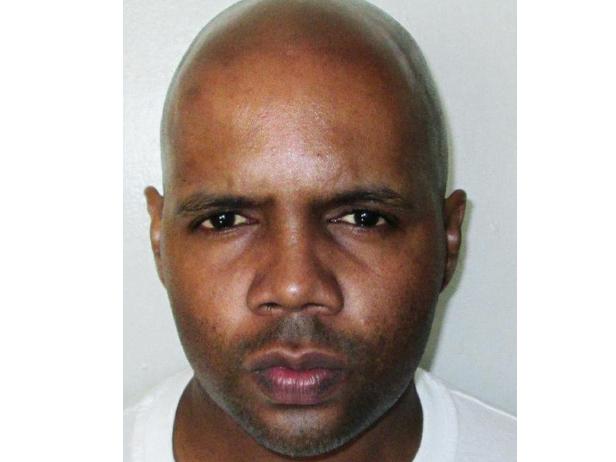Convicted murderer raises 'V' sign and says 'I hate you' as final words before execution
Torrey Twane McNabb put to death in Alabama for 1997 shooting of police officer Anderson Gordon

Your support helps us to tell the story
From reproductive rights to climate change to Big Tech, The Independent is on the ground when the story is developing. Whether it's investigating the financials of Elon Musk's pro-Trump PAC or producing our latest documentary, 'The A Word', which shines a light on the American women fighting for reproductive rights, we know how important it is to parse out the facts from the messaging.
At such a critical moment in US history, we need reporters on the ground. Your donation allows us to keep sending journalists to speak to both sides of the story.
The Independent is trusted by Americans across the entire political spectrum. And unlike many other quality news outlets, we choose not to lock Americans out of our reporting and analysis with paywalls. We believe quality journalism should be available to everyone, paid for by those who can afford it.
Your support makes all the difference.A man who killed an Alabama police officer 20 years ago was put to death on Thursday, following a last-ditch effort to challenge his execution.
Torrey Twane McNabb addressed his family when asked for a final word: “Mom, sis, look at my eyes. I have no tears. In my eyes, I'm not afraid.”
Then, in a final act of defiance, he cursed at the state of Alabama.
“I hate you motherf-ers. I hate you. I hate you,” he said, according to al.com, whose reporter witnessed the execution Thursday night.
Just before he lost consciousness, McNabb raised both of his middle fingers.
The execution was carried out just before 9pm Central at Holman Correctional Facility in Atmore, Alabama.
McNabb, 40, was pronounced dead less than an hour later.
He had been condemned to die after he was convicted of the death of Montgomery police officer Anderson Gordon. The 30-year-old officer was killed on 24 September 1997, after he arrived at a crash that McNabb caused while fleeing a bail bondsman, prosecutors said.
McNabb shot the officer five times while Gordon was sitting in his patrol car.
“Over 20 years ago, we lost a companion, a father, a brother and a friend who only wanted to make a difference in his community,” the officer's family said in a statement that was read by Alabama Department of Corrections Commissioner Jefferson Dunn at a news conference. “...Although the wounds of having a family member murdered can never be healed, through this tragedy, the Gordon family has remained strong and will continue to be resilient... Though this has been a difficult day for the Gordon family, we also continue to pray for the family of Torrey McNabb.”
McNabb's lawyers sought to stop the execution because of his involvement in a pending lawsuit challenging the state's lethal injection procedure.
Inmates, including McNabb, argued that the procedure involves a controversial sedative that does not make people completely unconscious, making them suffer an agonising death as subsequent drugs are injected to stop their heart and lungs.
A three-judge panel of the US Court of Appeals for the 11th Circuit, which has jurisdiction in Alabama, had earlier upheld a stay on the execution to allow for more proceedings on the lawsuit, the Associated Press reported. The decision prompted the Alabama Attorney General's Office to ask the Supreme Court to intervene, arguing that the justices had already allowed four other lethal injections involving the sedative midazolam.
The Supreme Court delayed McNabb's execution just minutes before the procedure was supposed to start to consider his attorneys' request. The justices allowed the execution to proceed two hours later.
During the execution, McNabb's family and attorneys expressed concerns that he remained conscious after the sedative was injected.
“He's going to wake up,” one of his family members whispered, according to the AP.
McNabb appeared to be breathing for 20 minutes after he was injected with the midazolam. He moved his head, grimaced and raised his arms after a guard pinched him, said his name and pulled back his eyelid to check if he was conscious, the AP reported.
Dunn, the commissioner, said the movements were involuntary.
Alabama uses midazolam and two other drugs during lethal injections. The sedative has been used in several executions in recent years that either took longer than normal or were apparently bungled. In 2014, an Oklahoma inmate writhed and grimaced before dying; an investigation later found issues with the IV insertion. That same year, an Arizona inmate's execution took nearly two hours as he gasped for air and struggled to breathe, while an Ohio inmate took 30 minutes to die.
In 2015, the Supreme Court heard a case involving Oklahoma's use of midazolam after those high-profile executions. A bitterly divided court upheld the use of the drug.
In December, a deadlocked Supreme Court decided not to intervene in the execution of an Alabama inmate, who coughed and heaved for 13 minutes before he died.
The Washington Post
Join our commenting forum
Join thought-provoking conversations, follow other Independent readers and see their replies
Comments